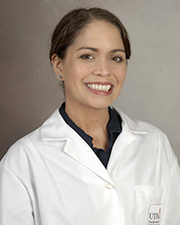Amanda Lutz Jagolino-Cole, MD, FAHA, FAAN

Associate Professor
Department of Neurology
McGovern Medical School
UTHealth Houston
Email: [email protected]
Phone: (713) 500-7566
Educational Philosophy
As a Peace Corps volunteer English teacher, I utilized the communicative method and experiential learning theory. Decades later I remember: ordering from an English menu had higher impact than repetition of food-related phrases. These approaches target language study and medical education. This experience, coupled with the interest I acquired during Vascular Neurology fellowship in broadening quality neurologic care to under-resourced settings via telemedicine, has guided my career to date. Telemedicine patient care must be held accountable for as high-quality care as in-person, by holding telemedicine education to the same standards as in-person medical education. Most rewarding is witnessing the moment a learner emerges from the initial awkward fumbling of technology, verbiage, and organization of a telemedicine encounter by adapting and applying their prior in-person knowledge and skills. Intentional telemedicine curricula at the medical student, residency, and fellowship level facilitate this level of comfort.
Constructivist approach can accurately describe this approach to educating students on how to apply their developing in-person patient care skills to a remote setting. Each level of medical education, and each individual learner’s experiences and comfort level with in-person patient care, influences what they can effectively learn about telemedicine, activate telemedicine skills, and how they will navigate their learning process. This can be achieved through student reflection, interactive modules, hands-on practice with equipment and through simulation, supervision appropriate to the learner’s level, both formative and summative feedback after mock or actual patient encounters. Telemedicine case conferences can facilitate group reflection and peer-level feedback. Case logs can serve as an assessment tool but also allow learners to reflect on “lessons learned”. Benchmarks, specific to the setting in which telemedicine is provided, help evaluate both learners and telemedicine curricula. Such learning tools can be laborious to create and update, yet the investment is worth it in our current state of telemedicine education, limited by complex educational agreements, lack of dedicated time, space, and telemedicine technological and educational resources. A diversity of educational offerings also increases the catchment of student learning skills and preferences.
Longitudinal exposure is also key in solidifying telemedicine skills. Telemedicine education should be incorporated early in student education and be normalized into curricula, in order to allow learners to build their skills on experiences, and prepare them for however telemedicine may supplement their patient care once in independent practice. Education is also best fostered by a collaborative group of educators with diverse experiences. An educational community should ideally seek contribution from multiple academic levels (students to faculty) and stakeholders from applicable disciplines, clinical leadership, professions, and outside institutions. All should envision a sustainable yet constantly evolving educational environment.
These are some examples of my own philosophy towards educating medical students, residents, and fellows, through the lens of teaching telemedicine. While I have committed towards a lifetime of remodeling and refining of my teaching skills, I know these core approaches will withstand the time and circumstance. They have already done so, whether teaching English to high school students in another country, or doing my part to best prepare our students and trainees to be productive and satisfied physicians.
Areas of Expertise/Interests
My educational experiences are in application of in-person patient care skill to telemedicine settings. Ultimately, the goal is to provide as equivalent quality care remotely as we do in person, through intentional practice and reflection. Additionally, am interested in incorporating leadership and mentorship into health education programs. I seek to help empower learners in their career development.
Past and Current Educational Activities:
-Vascular Neurology Fellowship, Program Director
-Academy of Master Educators, Member
-Associate Editor, Neurology Clinical Practice
-Curriculum Committee
-National neurology organization education committees
-Vascular Neurology Fellowship Telestroke Course Director
-Neurology Residency Teleneurology Course Director
-Telemedicine Medical Student Elective Course Director
-UT Teleneurology Director – community and spoke hospital education
-The University of Texas Kenneth I. Shine, M.D. Academy of health Science Education Small Grant: Principal Investigator
-American Board of Psychiatry and Neurology Faculty Innovation in Education Award: Principal Investigator
Honors/Awards:
-McGovern Medical School Dean’s Teaching Excellence Awards
-McGovern Medical School Women Faculty Forum Excellence Awards Rising Star Award, 2020
Selected Publications:
Jagolino AL, Jia J, Gildersleeve K, Ankrom C, Cai C, Rahbar M, Savitz SI, Wu T. A Call for Formal Telemedicine Training During Stroke Fellowship. Neurology. 86: 1827-1833, 2016.
Jagolino-Cole AL, Bozorgui S, Ankrom CM, Bambhroliya AB, Cossey TD, Trevino AD, Savitz SI, Wu TC, Vahidy F. Benchmarking Telestroke Proficiency: Page-to-Needle Time Among Neurovascular Fellows and Attendings. Stroke. 48:2618-2620, 2017.
Zha AM, Chung LS, Song SS, Majersik JJ, Jagolino-Cole AL. Training in Neurology: Adoption of resident teleneurology training in the wake of COVID-19: Telemedicine crash course. Neurology. 95(9): 404-407, 2020.
Limaye K, Ortega-Gutierrez S, Mokin M, Jagolino A, Sheth SA, Jadhav AP. Exposure to Neurointervention during Neurology Training. Stroke. 52(9):e550-e553, 2021.
Das S, Mokin M, Sheth SA, Jadhav A, Jagolino-Cole A, Ortega-Gutierrez S, Novakovic-White R, Al-Mufti F, Hassan AE, Nguyen TN, Fifi JT, Narayanan S, Masoud HE, Zaidat O, Linfante I, Grotta J, Nogueira RG, Liebeskind DS, Liang C. Neurology Trainee Attitudes Towards Neurointervention: Results from an International Survey. Stroke: Vascular and Interventional Neurology. 2(2):e000105, 2022. DOI: 10.1161/SVIN.121.000105.